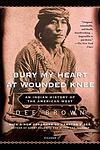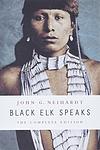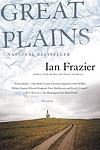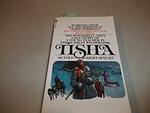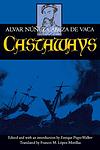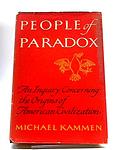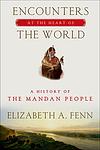The Greatest "Nonfiction, Native American" Books of All Time
Click to learn how this list is calculated.
This list represents a comprehensive and trusted collection of the greatest books. Developed through a specialized algorithm, it brings together 300 'best of' book lists to form a definitive guide to the world's most acclaimed books. For those interested in how these books are chosen, additional details can be found on the rankings page.
Genres
Countries
Date Range
Reading Statistics
Click the button below to see how many of these books you've read!
Download
If you're interested in downloading this list as a CSV file for use in a spreadsheet application, you can easily do so by clicking the button below. Please note that to ensure a manageable file size and faster download, the CSV will include details for only the first 500 books.
Download-
1. Bury My Heart at Wounded Knee by Dee Alexander Brown
This book is a compelling historical narrative that chronicles the systematic decimation of Native American tribes in the United States during the late 19th century. The author uses council records, autobiographies, and firsthand descriptions to provide a detailed account of the battles, massacres, and broken treaties that led to the destruction of the Native American way of life. The book centers on significant events such as the Battle of Little Bighorn and the Wounded Knee Massacre, offering a voice to the often overlooked Native American perspective.
-
2. Tristes Tropiques by Claude Lévi-Strauss
"Tristes Tropiques" is a blend of autobiography, travel literature, and anthropology by a renowned scholar. The book is a recounting of the author's travels and anthropological work, primarily in Brazil, in the 1930s. It provides a critical and philosophical reflection on his experiences and observations, offering insights into indigenous tribes like the Nambikwara and Tupi-Kawahib, and exploring themes of cultural change, the nature of anthropology, and the author's own disillusionment with Western civilization.
-
3. Down Second Avenue by Es'kia Mphahlele
"Down Second Avenue" is a semi-autobiographical account of a black man's life under apartheid in South Africa. The narrative chronicles the protagonist's journey from childhood to adulthood, detailing his experiences with poverty, discrimination, and the struggle for education. Despite the harsh realities of life under apartheid, the protagonist's resilience and determination shine through, offering a poignant and powerful critique of the socio-political realities of the time.
-
4. Black Elk Speaks by John G. Neihardt
"Black Elk Speaks" is a profound narrative that recounts the life of a Native American medicine man from the Oglala Lakota tribe. It provides a unique perspective on the Lakota people's history and culture, their spiritual beliefs, and the impact of westward expansion on their way of life. The book also delves into the protagonist's personal spiritual visions, which he believes have significant prophetic and healing powers. The narrative is a poignant exploration of the clash between cultures and the devastating effects of colonization on indigenous peoples.
-
5. Popol Vuh: The Mayan Book of the Dawn of Life by Dennis Tedlock
This book provides a comprehensive English translation of the Popol Vuh, the ancient Mayan creation myth. The narrative covers the genesis of the world, the adventures of the Hero Twins, the creation of humans, and the establishment of the Mayan civilization. The book also includes extensive commentary and notes, providing readers with a deeper understanding of the cultural and historical context of the Mayan myth.
-
6. Great Plains by Ian Frazier
"Great Plains" is a travelogue that takes readers on a journey through the vast expanse of the American Great Plains, exploring its history, geography, and culture. The author travels from North Dakota to Texas, delving into the history of Native Americans, pioneers, and outlaws. The book provides a detailed account of the region, its people, and its significance in shaping the American West, offering a vivid portrait of the landscape and its influence on the country's identity.
-
7. The True History of the Conquest of New Spain by Bernal Díaz del Castillo
This book provides a first-hand account of the conquest of Mexico by the Spanish during the 16th century. It offers a detailed narrative of the events, battles, and interactions with native tribes, including the Aztecs. The author, a soldier in the Spanish army, provides a unique perspective on Hernán Cortés and his tactics, the politics of the time, and the cultural and religious practices of the indigenous people. The book also highlights the hardships, challenges, and ethical dilemmas faced by the conquistadors.
-
8. This Hallowed Ground by Bruce Catton
"This Hallowed Ground" is a comprehensive, detailed account of the American Civil War, from its origins to its aftermath. The book provides a vivid narrative of the battles, political events, and key figures of the war, skillfully blending historical facts with engaging storytelling. The author's perspective as a historian and journalist brings the era to life, offering readers an in-depth understanding of this pivotal period in American history.
-
9. Tisha by Robert Specht
"Tisha" is a biographical novel based on the true story of a young woman who moves to the Alaskan wilderness in the 1920s to become a teacher. The protagonist faces numerous challenges including harsh weather, isolation, and cultural differences, but remains steadfast in her commitment to educate the children in her care. The story also explores her fight against racial prejudice in the community, as well as her love affair with a half-Native man.
-
10. Collapse by Jared Diamond
"Collapse" is an exploration of why certain societies throughout history have thrived while others have deteriorated and collapsed. The book delves into environmental problems, climate change, rapid population growth, and unwise political decisions as factors that contribute to the downfall of a civilization. The author uses examples from history such as the Mayans, the Vikings in Greenland, and modern examples like Rwanda and Haiti, to illustrate his points. It serves as both a historical analysis and a warning for modern societies to learn from the past in order to avoid a similar fate.
-
11. Slavery by Another Name by Douglas A. Blackmon
The book explores the concept of "neoslavery," which entrapped thousands of African Americans in the South in a system of forced labor after the Civil War. This system was perpetuated by local laws, racial prejudice, and economic manipulation, where black men were arrested on false charges, then sold to companies as cheap labor. The book illuminates the forgotten history of this "age of neoslavery" that persisted into the 20th century and its profound impact on the racial disparities that exist today.
-
12. Castaways by Alvar Núñez Cabeza de Vaca
"Castaways" is a historical narrative that recounts the experiences of an early Spanish explorer who, along with his crew, shipwrecks off the coast of Florida. Stranded in unknown territory, the survivors must learn to adapt to the harsh environment, interacting with native tribes and navigating through unfamiliar landscapes. The story is a testament to human resilience and the profound impact of cross-cultural encounters during the age of exploration.
-
13. The Wordy Shipmates by Sarah Vowell
"The Wordy Shipmates" is a historical narrative that explores the journey and lives of the Massachusetts Bay Colonists, who left England in the 1630s in pursuit of religious freedom in America. The book delves into the paradoxes of these Puritans, who were both freedom seekers and authoritarians, and their influence on American identity. It also provides a detailed look at their relationships, conflicts, and the hardships they faced, all set against the backdrop of their religious and political beliefs.
-
14. The Problem of Slavery in the Age of Emancipation by David Brion Davis
"The Problem of Slavery in the Age of Emancipation" is a historical work that explores the complexities of slavery and the abolitionist movement during the Age of Emancipation. The book delves into the moral, political, and ideological challenges faced during this time, focusing on the struggles of enslaved Africans and African Americans. It also examines the role of colonization and the struggle to redefine "black" and "white" identities in the aftermath of slavery. The author uses a comparative approach, looking at the American, British, and French experiences of slavery and emancipation.
-
15. People of Paradox by Michael Kammen
"People of Paradox" is an in-depth study of American culture and the inherent contradictions within it. The book explores the paradoxes that exist in various aspects of American life, including politics, art, and social behavior. It offers a historical perspective, tracing these contradictions from the time of the country's founding to the present day. The author provides a thought-provoking analysis of how these paradoxes have shaped the national identity and continue to influence American society.
-
16. William Cooper's Town by Alan Taylor
"William Cooper's Town" is a historical narrative that explores the life of William Cooper, a self-made man who became a judge and congressman in early America. The book delves into the economic, political, and social transformation of America during the late 18th and early 19th centuries, using Cooper's life and the development of Cooperstown, New York as a microcosm. The author also analyzes the impact of Cooper's famous son, a novelist who portrayed the American frontier and its Native American inhabitants.
-
17. Encounters at the Heart of the World by Elizabeth A. Fenn
This historical book delves into the rich and vibrant history of the Mandan Indians, a Native American tribe from the Great Plains region of the United States. The book details their complex agricultural society, their interactions with European explorers and traders, and the devastating impact of smallpox epidemics on their population. The narrative provides a comprehensive and vivid account of the tribe's cultural practices, social structures, and their resilience in the face of adversity.
Reading Statistics
Click the button below to see how many of these books you've read!
Download
If you're interested in downloading this list as a CSV file for use in a spreadsheet application, you can easily do so by clicking the button below. Please note that to ensure a manageable file size and faster download, the CSV will include details for only the first 500 books.
Download